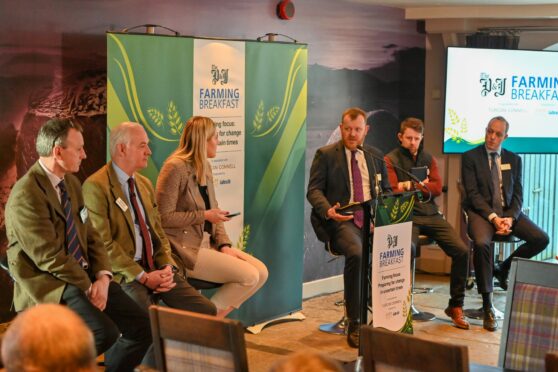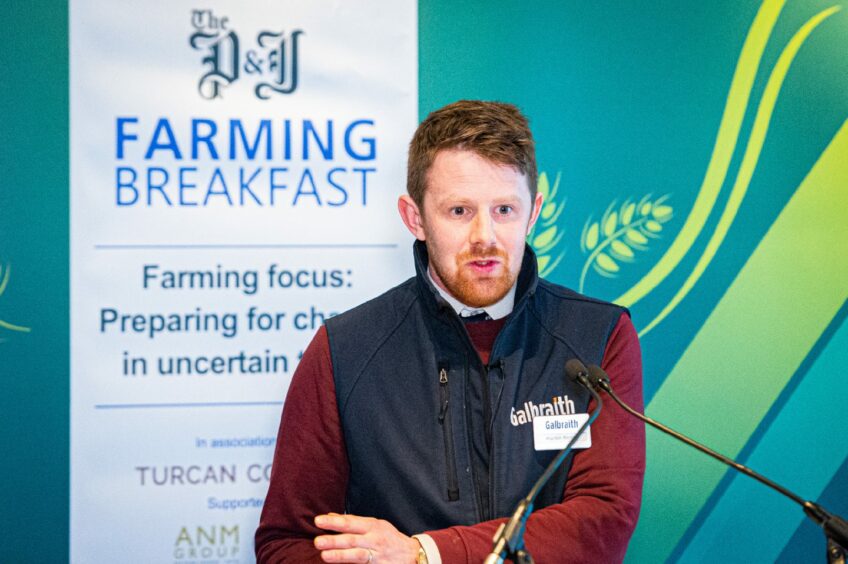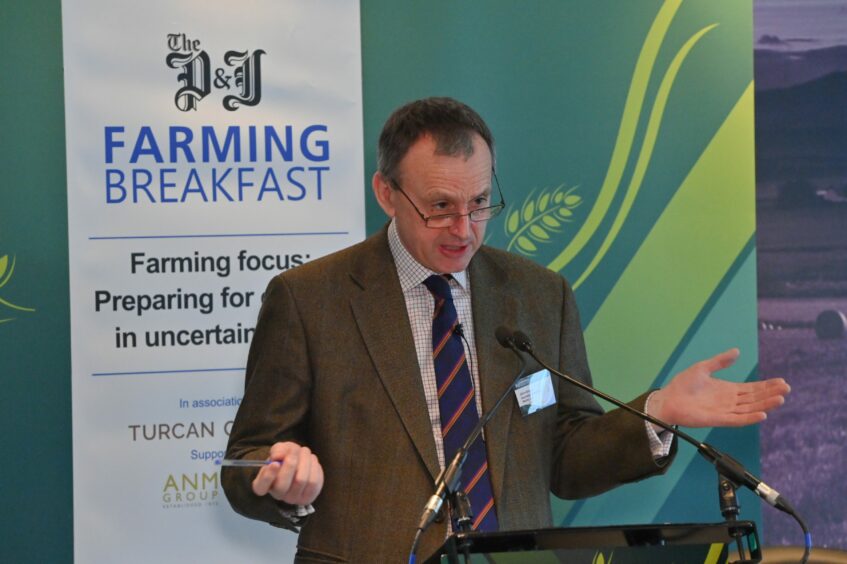The Press & Journal ‘s Farming Breakfast was hailed a great success, with attendees hearing top tips and advice from leading individuals in the agricultural and business industry.
Grierson Dunlop, land and property partner at Turcan Connell, touched on the recent land reform consultation Land Reform In A Net Zero Nation, which he said would be a stepping stone to new legislation.
He told the audience that there is a possibility if a farm is not on the land register (not digitally mapped onto the modern system), it could jeopardise the farmer from qualifying for support.
Mr Dunlop discussed the RCI (Register of Persons Holding a Controlled Interest in Land) which was due to come in to place next year.
He said farmers must make sure that if title deeds don’t marry up with the true ownership, paperwork must be submitted to the new register.
Mr Dunlop said that other new proposals could include a new land use tenancy – a hybrid which would allow agricultural and non-agricultural activity in the same lease.
He seemed doubtful of this proposal and said the genesis behind this was to allow both the tenants and the landlords to get a slice of the action in projects such as tree planting or carbon.
Changes could also be made to tenants rights in terms of when a piece of land is taken out of a tenancy or if the whole farm is taken back.
There is a suggestion that the tenant’s position could be strengthened in terms of what they are entitled to in these circumstances.
Martin Rennie, an agricultural consultant with Galbraith, stressed the importance of IACS forms and trading entitlement, reminding farmers of the deadlines dates for transfer entitlement on April 3 and IACS on May 15.
He advised farmers to look at IACS forms now to check whether they are short on entitlement, have too many or there is a change.
Mr Rennie also spoke about contracting farming agreements and said because of the changes and uncertainty in the industry, it was important that those involved made sure there was a review clause if subsidies were to drop or change overnight.
The audience was also provided with some shocking facts which Mr Rennie read in a recent article.
“The profit on six beef burgers sold on the supermarket shelf is 8.7p,” he said.
“Of that split, 7p goes to the retailer, 1p to the processor, 0.6p to the cutting plant and just o.1p to the beef farmer.
“Subsidy is an issue but the whole farming gene needs looked at and analysed. Are our farmers getting a slice of the plot?”
Tom Stewart, partner at Galbraith, said the farmland market had been extremely brisk over the last 18 to 24 months and there was no sign of it cooling.
He said farms from the top of the hills down to the very best of land had been attracting huge interest and there has also been an appetite for off market deals.
Mr Stewart focused on succession which he said is often left in the ”too difficult pile” and urged farmers to remind themselves of the youth and enthusiasm that can be brought to businesses.
He said that the market for secure tenancies is developing ”rapidly” and said there was more encouragement for landlords and tenants to get together and go through the process out with the legal framework.
John Angus, head of livestock at Aberdeen and Northern Marts, spoke about the affect dropping livestock numbers would have in the whole sector.
“If we lose the critical mass of livestock in the system, then we risk losing our whole industry from farmers to auctioneers to abattoirs, along with many agricultural dependent businesses,” he said.
“Look what has happened to the vegetable and salad shelves in the supermarkets – we certainly don’t want the same scenes in our butchers shops and meat counters.”
Mr Angus touched on the increasing average age of farmers and the lack of young people wanting to come into the industry.
“Trying to get good stockmen to work with livestock is proving almost impossible,” he said.
“This is not a new problem, but we now have a new generation of people who are driven by more than just wanting to follow in fathers and grandfathers footsteps. Instead, people want to be valued and rewarded with a credible return as well as not having to work all the hours.
“Changes to land reform and the right to buy has effectively closed the door on the majority of young entrants. We must develop a starter scheme to enable our industry to grow.
“If we don’t, we risk losing youngsters with drive and potential who can be our future.”




